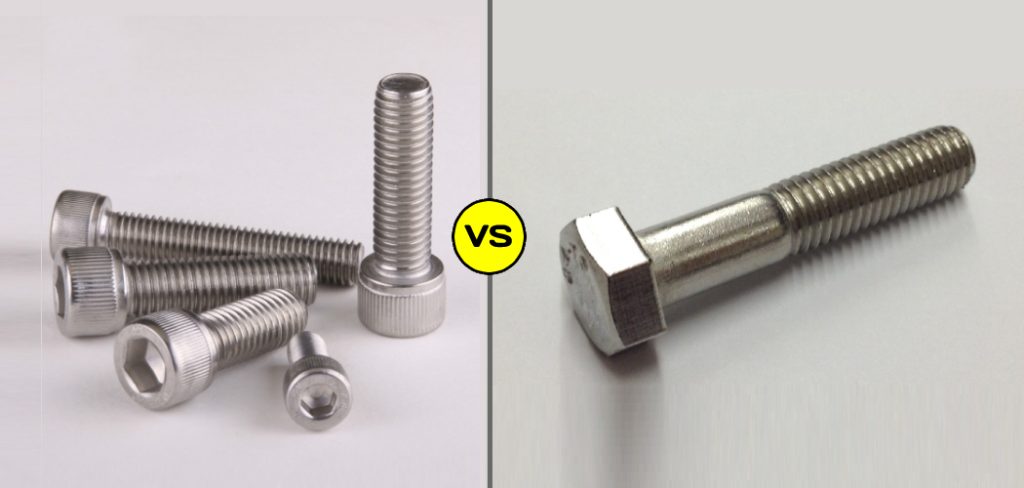There are several, many different bolts, and each has its advantages and disadvantages. Two of the most common bolts are Allen and hex bolts. Here is a comparison of the two types of bolts to help you decide which is suitable for your needs. Continue reading the article to clear up the confusion.

Table of Contents
- Allen Bolt
- Hex Bolt
- Difference Between Allen Bolt and Hex Bolt
- Which Type of Bolt is Right for Your Specific Project?
- Conclusion
Allen Bolt
An Allen bolt is a type of bolt with a hexagonal socket in the head, allowing it to be turned with an Allen wrench (hex key). Allen bolts are also known as hex bolts and socket screws.
Allen Bolt’s Advantages and Disadvantages:
Advantages:
- The hexagonal socket in the head of an Allen bolt allows it to be installed with an Allen wrench (hex key), a simple and familiar tool.
- Allen bolts are typically lighter than hex bolts of the same size, making them easier to work with.
- It provides basic safety, as it can only be opened with a socket wrench. (Example: I feel safe for Allen bolts on my bicycle.)
- Less likely to damage the surrounding area when installing or removing.
Disadvantages:
- Allen bolts are not as strong as hex bolts.
- Allen bolts are more expensive than hex bolts.
- It can strip too quickly if it is of poor quality.
- Mud and dirt accumulate on the bolt head.
- If the bolt head is stripped, there is trouble
Hex Bolt
A hex bolt is a type of bolt with a hexagonal head, allowing it to be turned with a wrench or pliers. Hex bolts are also known as hex cap screws or machine bolts.
Hex Bolt’s Advantages and Disadvantages:
Advantages
- Easy to install and remove.
- Stronger than Allen bolts.
- Less expensive & available easily
- These bolts can be installed with a wrench or pliers, which are simple and standard tools.
- Less likely to strip than Allen bolts.
Disadvantages
- Heavier than Allen bolts.
- It isn’t easy to fit in tight spaces
Difference Between Allen Bolt and Hex Bolt
Some critical differences between Allen and hex bolts may make one more suitable than the other for your specific project.
Head Shape
The main difference between Allen bolts and hex bolts is the head shape. Allen bolts have a hexagonal socket in the head, while hex bolts have a hexagonal head.
Bolt’s Drive Type
Allen bolts, also known as socket screws, require a socket wrench (hex key) to be installed. On the other hand, hex bolts can be installed with a wrench or pliers.
Bolt’s Weight
Allen bolts are typically lighter than hex bolts of the same size. It is because an Allen bolt’s head is smaller than a hex bolt’s head.
Strength
Allen bolts are not as strong as hex bolts. This is because the head of an Allen bolt is smaller, and there is less material to resist shearing and twisting forces.
Price/Cost
Allen bolts are typically more expensive than hex bolts. This is because they are more challenging to manufacture and require a more specialized installation tool.
Which Type of Bolt is Right for Your Specific Project?
Several key differences between Allen and hex bolts may make one more suitable than the other for your specific project.
The type of bolt that is right for your specific project will depend on several factors, including the strength required, the weight of the bolt, the price, and the ease of installation. A hex bolt may be the best option if you need a strong bolt that is easy to install. If you need a lighter bolt that is more expensive, an Allen bolt may be the best option.
Allen bolts are typically used in applications where a higher degree of precision is required, such as in machinery or electronics. They are also used in applications with a lower profile, such as furniture or cabinets, as desired. Hex bolts are typically used in heavy-duty applications, such as construction or automotive.
Conclusion
So, which type of bolt is right for your needs? Maybe you can decide now based on your work. We are interested to know what kind of work you want to use these bolds and your good and bad experiences. We will try to give you suitable suggestions.
